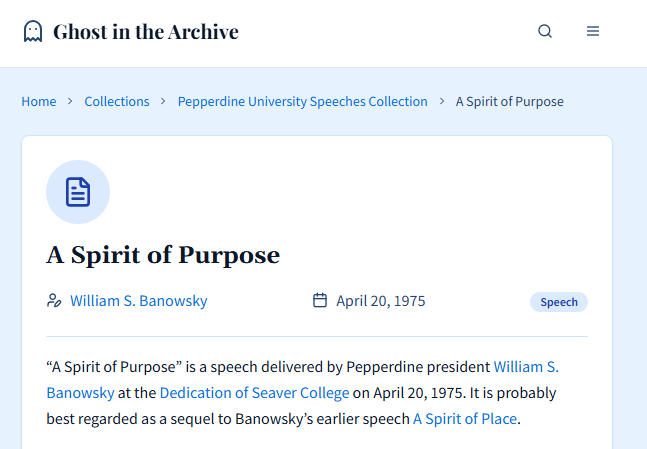One of my goals here at Ghost of George Pepperdine is to familiarize readers with Pepperdine University’s past. So for the last 18 months, I’ve been writing short histories informed by my reading of primary sources from the university’s archives and in conversation with the existing secondary literature. I plan to continue this work for the foreseeable future.
I try to write these histories in such a way that they are interesting and accessible to readers who are unlikely to write any Pepperdine history of their own. But I also hope my histories (and especially the footnotes) can serve as a map of related materials in the archives to aid future research.
But let’s face it: even with eager archivists standing ready to hunt down folders at your request, and even with so many sources available online in the university’s digital collections (including back issues of The Graphic and yearbooks), there’s still just a ton of important documents that you’ll never be able to read if you don’t have time or inclination enough to bug the good folks at Special Collections to haul them out of storage for you.
And if you won’t realistically undertake this effort, you have no way to know whether any one of my quotations from or construals of archival sources is accurate or grievously taken out of context. For sources that have already been digitized, I try to provide links, but for so many of my sources this isn’t possible. As part of my research process, I habitually transcribe the archival documents I cite in my writing. I’ve built up quite a collection of them, now numbering over 350. But I’ve had no good way to share these transcriptions with you until now.
Ghost in the Archive is my latest project. It’s a website where I can publish my transcriptions of the archival documents that inform my historical writing. So if you read my recent essay on the dedication of Seaver College and it made you wish you could read Ronald Reagan’s speech from that ceremony, it’s now available online for the first time. Or if you read my history of sectarianism at Pepperdine and wished you could read Howard A. White’s memo on the university’s church relationship, now it’s as easy as clicking a link.
In future posts citing archival materials, I’ll include in my footnotes links to the new site, so you’ll have easy access to full-text transcriptions. For now, I’ve gone back through a few recent posts and added links where I have already uploaded transcriptions. It will take time for me to get the rest of the documents transferred over to the new site.
Ghost in the Archive is more than just an online repository of my transcriptions, though, because there’s another hurdle to clear when you’re reading these documents. So often, archival correspondence or diary entries make shorthand references that were legible to the writer and his contemporaries but that are not always clear to modern readers without the proper context. Even if you have some basic notions of who’s who in Pepperdine history, it’s not always easy to know whether an offhand reference to “Helen” means Helen Young or Helen Pepperdine. And you have to hope that everyone’s spelling is good or else you’ll waste time trying to figure out who “Dumpke” is when it was actually a typo for Cal State chancellor Glenn Dumke. I’ve already done the work of disambiguating these kinds of references once—why should you have to do it all again?
In an attempt to solve these sorts of problems, the transcriptions on Ghost in the Archive have been painstakingly hyperlinked, so clicking an uncertain Helen or Dumpke will bring you to a page of helpful context with a brief bio-sketch of the person in question—except it’s not just people: There are context pages for important places and events, as well. I haven’t uploaded many of these pages yet, but I have hundreds of these topical notes in my private files. Once they’re all on the site, they’ll form a web of densely interlinked pages on Pepperdine history, like a little Pepperdine Wikipedia.
This project is still in the early stages, and I can’t be sure that I’ve ironed out all the bugs yet. I hope to introduce new features in the weeks to come, and I plan to add more transcriptions and context as well. I would appreciate any suggestions you have, either for new features or for specific sources.
If you’re so inclined, please check out the new site (it’s at https://ghostinthearchive.com), share it with anyone who might be interested, and let me know what you think of it. Happy reading!





